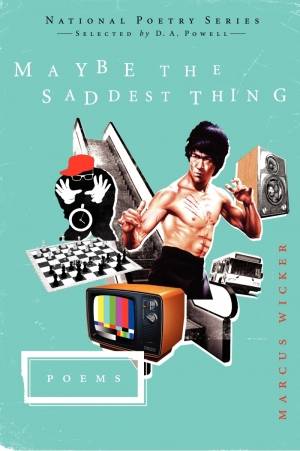As soon as you open Marcus Wicker’s 2011 poetry collection Maybe The Saddest Thing and see poem titles like “Love Letter to Dave Chappelle”, “Everything I Know About Jazz I Learned from Kenny G”, and “Ars Poetica in the Mode of J-Live”, you know to expect the unexpected. Wicker’s high-energy poems examine both self and surroundings with a sharp sense of humor and a poignant ability to capture the tensions and uncertainties of everyday life.
 Wicker has been published in a wide variety of journals and magazines and had his debut collection selected by notable poet D.A. Powell to be published as part of the National Poetry Series. He has received several fellowships, including the 2011 Ruth Lilly Fellowship, and was honored with a NAACP Image Award in 2012.
Wicker has been published in a wide variety of journals and magazines and had his debut collection selected by notable poet D.A. Powell to be published as part of the National Poetry Series. He has received several fellowships, including the 2011 Ruth Lilly Fellowship, and was honored with a NAACP Image Award in 2012.
He kindly agreed to answer a few questions about his writing and inspiration for Smile Politely prior to his Pygmalion appearance.
Smile Politely: What first got you into poetry? Do you remember any particular poems or poets who initially sparked your interest?
Wicker: My 10th grade American Lit teacher, Mrs. Andrew-Vaughan. She took our class to the National Youth Poetry Slam at the University of Michigan. I was in awe of all the teens my age from all around the country, reading fierce, wrought poems with abandon. At that point I was writing what I thought was poetry but rarely did I share. I suppose it was those nameless kids that sparked something in me.
SP: I can honestly say that yours were the first poems I had ever read about Flavor Flav or RuPaul. You captured both of them perfectly. Do you include so many pop culture references in your poems in the hopes of appealing to a broader audience, or is there another reason why you find those images and icons so compelling?
Wicker: Writing is the way that I enter the world, or demystify my own obsessions. The impetus for those poems came out of my graduate school existence—reading bell hooks and Susan Bordo by day and binge watching Flavor of Love by night. ‘Who does this?,’ I thought. And then there’s the matter of my very earnest affection for Ru and Flav. Some might call their antics baser or caricature, but I’ve got to believe they’re just really great at embracing their multiple selves — a notion I’m completely jealous of.
SP: Many of your poems reference hip-hop or other music and play around with sound and rhythm quite a bit. I found myself wanting to read them all out loud. I also noticed quite a few nods to classic poetic forms, though. When you’re crafting a poem, how much attention do you pay to its formal structure versus its sound?
Wicker: Because my intentions aren’t singular, neither are the sounds or forms that contain them. I suppose the simple answer is, I try my best to wed subject matter with a container — ghazal, sonnet, aubade, whatever — that enacts that content.
SP: You recently participated in the #BlackPoetsSpeakOut movement, a “poetic protest” in response to Ferguson. How did your involvement in that affect the way you think about your own poetry and your role as poet/cultural observer?
Wicker: Around the time of the initial protest, my current project was beginning to feel a bit starched. Too tactful. BPSO reminded me that “art for art’s sake” and “art as social protest” occupy equal space in my heart. More than that, I feel personally compelled to add my voice to the current moment of resistance in hopes that speaking out against police brutality, in my way, will resonate with someone who needs to hear it.
SP: What projects are you working on now?
Wicker: I’m working on a book right now partially about gun violence against the black body, partially about the African American suburbanite, God and the Theodicy Question (Why do bad things happen to good people?). It’s getting there and I’m excited.
We’re excited that Marcus Wicker will be headlining the free Krannert Center Studio Theatre performance, reading at 10:30 p.m. on Friday, September 25th directly following Jennine Capo Crucet and Janaka Stucky.








